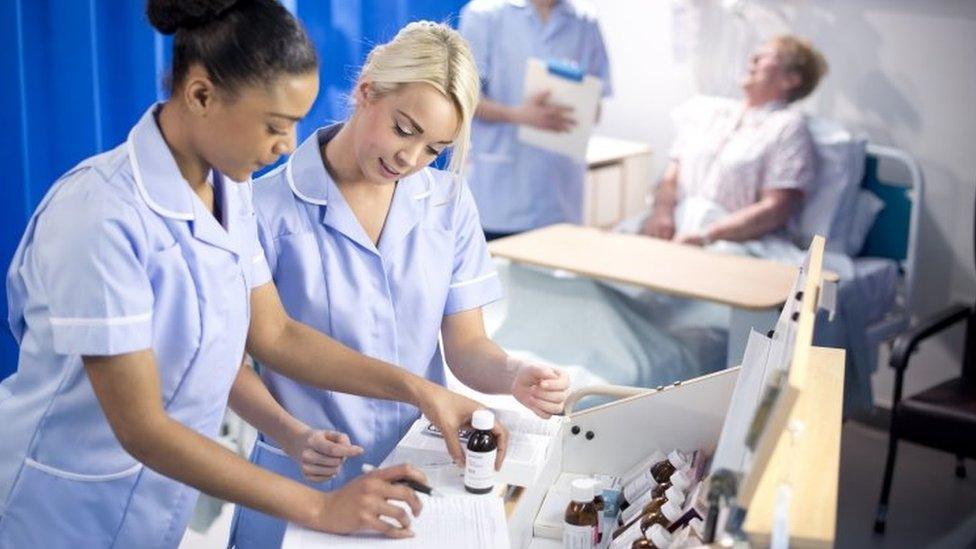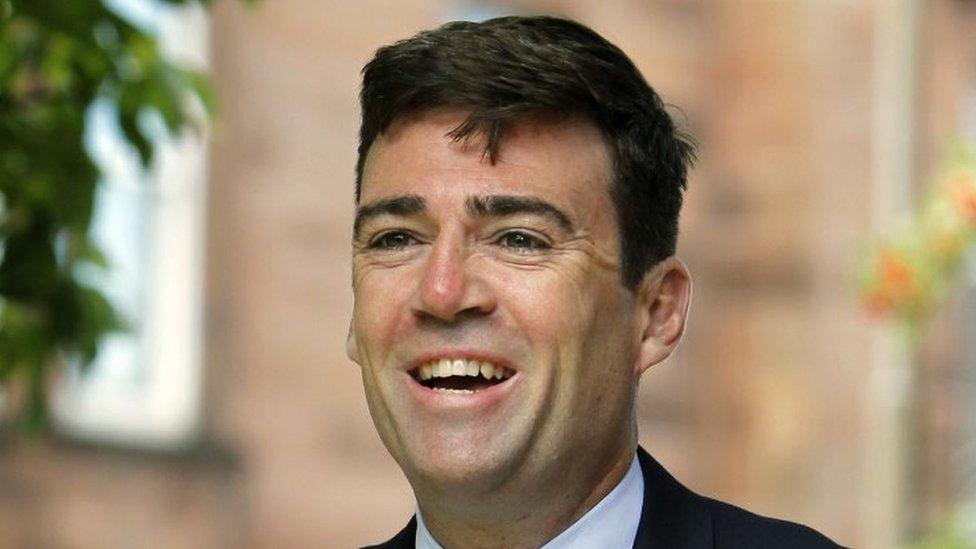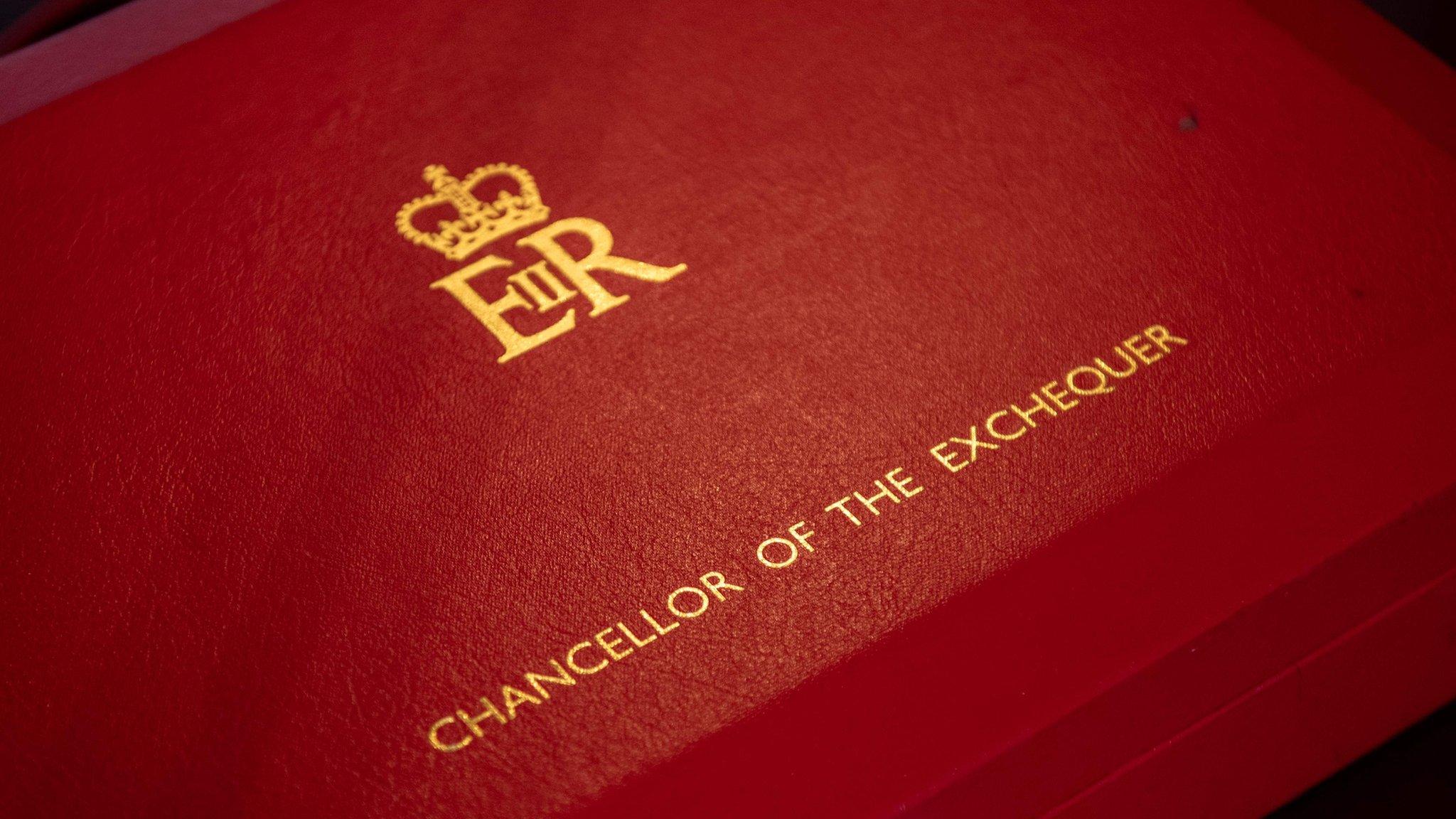Hammond v McDonnell on Budget 'end of austerity' claim
- Published
- comments
Budget headlines in two minutes
Philip Hammond has said there will be no "real terms" increase in public spending apart from on the NHS.
The chancellor used his Budget on Monday to say that austerity was coming to an end.
But Labour's shadow chancellor John McDonnell rejected his claims, saying more welfare cuts were coming and spending was still being squeezed.
Mr Hammond chose to spend a windfall from better tax receipts on the NHS, universal credit and income tax cuts.
Prime Minister Theresa May said bringing austerity to an end was "not just about more money into our public services, it is about more money in people's pockets as well".
She said Monday's Budget had put more money into the NHS without raising taxes, adding: "Indeed, we have cut taxes for 32 million people - the message of yesterday's Budget is that the hard work of the British people has paid-off."
But the Institute for Fiscal Studies said Mr Hammond may have "painted himself into a corner" by using a windfall from revised borrowing forecasts to fund increased spending on the NHS.
And it warned that tax rises are "all but inevitable" in the longer run to pay for the pressure on the NHS of Britain's ageing population.
Any expectation that Mr Hammond will now meet his target of eliminating the deficit by the mid-2020s was "for the birds", said IFS director Paul Johnson.
Public spending will go up by 1.2% but most of that will go to the health service in England, Mr Hammond told BBC Radio 4's Today programme.
He said next year's spending review would decide how much police, local government, schools, defence and other public services would get.
But "once you take out the commitment we have made to health, (it) gives a flat real spending available for all other departments".
He did not deny that some departments could face cuts but told Today the other option was that "everybody" would get a 0% increase in funding, once inflation was taken into account.
Hammond defends £400m for 'little extras' for schools
Philip Hammond is questioned on Today over his one-off £400m injection for schools
Teachers and parents have reacted with anger to the announcement, saying schools needed more money for teachers.
Labour's shadow education secretary Angela Rayner said Mr Hammond's choice of language was "utterly insulting to parents and teachers".
Mr Hammond told BBC Radio 4's Today programme the money was a "one-off" payment - and he would be looking at overall school spending next year.
"If a school needs to buy a couple of whiteboards or lap top computers or something like that. Having a cheque for £50,000 I would have thought would be quite useful for most schools," he told Today.
Tax and universal credit changes
The Resolution Foundation, a not-for-profit research and policy organisation, which says its goal is to improve outcomes for people on low and modest incomes, said poorer families would be about £30 a year better off from the tax cuts, with the top 10% earners £410 better off.
The organisation said better than expected public finances had given Mr Hammond an extra £74bn to play with - and he had used up three-quarters of that with the extra spending on the NHS, welfare and the income tax changes.
The personal allowance will rise to £12,500 and the higher rate threshold to £50,000 in April 2019, worth £130 a year for a typical base rate taxpayer.
Mr Hammond said the £1bn investment in universal credit would protect claimants moving onto the new system and a further pledge of £1.7bn a year would save millions of families £630 a year. But some MPs said it was not enough to undo cuts already made to the system in previous years.
What else was announced?
£400m to allow schools to "buy the little extras they need"
A digital services tax aimed at tech giants
Help for first-time buyers of shared ownership properties
Another freeze in fuel duty
A £30bn package for England's roads, including repairs to motorways and potholes
£900m in business rates relief for small businesses and £650m to rejuvenate high streets
Tighter tax rules affecting private sector contractors
A tax on plastic packaging which does not contain enough recycled materials - but no disposable plastic cup tax
An extra £1bn for the Ministry of Defence to boost cyber capabilities and anti-submarine warfare capacity
A further £650m of grant funding for English local authorities to spend on social care
There was a freeze on beer, cider and spirits duty, effectively saving 2p on a pint of beer, 1p on a pint of cider, and 30p on a bottle of Scotch or gin.
Wine duty will not be frozen and a bottle will go up by 8p from 1 February next year, and a packet of 20 cigarettes has gone up by 33p.
Health cuts next year?

By BBC Health Editor Hugh Pym
Spending on public health in England and doctors and nurse training is set to fall next year according to the fine print of the Budget documents.
The chancellor announced real terms funding increases for NHS England which provides front line services. But the rest of the Department of Health day to day budget next year (2019/20) will fall - the Health Foundation think tank says in real terms there will be a reduction of £1bn, or 12%.
This slice of funding covers prevention initiatives run by Public Health England and local authorities, including smoking cessation and sexual health. It also includes the budget for Health Education England.
The previous chancellor, George Osborne, was criticised for announcing increases for NHS England while at the same time cutting allocations for public health and medical and nurse training.
The Brexit factor
It was the last Budget before the UK's scheduled exit from the EU, and came with the final relationship between the two sides yet to be agreed.
There was an extra £500m to prepare for what happens if the UK leaves the EU without a deal - a scenario Mr Hammond has said would require a whole new Budget.
The chancellor also promised a "double deal dividend" if the UK and the EU reached agreement over Brexit, which he said could give him more cash to spend on public services.
But he said he had been "very cautious" in maintaining fiscal headroom - the gap between what he can borrow and what he is planning to borrow - in case of a "shock" to the economy, such as a no-deal Brexit.
A general election Budget?
Jeremy Corbyn: "This is a broken promise Budget"
Mr Hammond rejected suggestions his Budget giveaways were meant to pave the way for a general election, telling ITV's Good Morning Britain: "We've now turned a corner and we are able to give Britain a bit of good news."
Mrs May, speaking at a summit of Northern European leaders in Norway, rejected talk of a snap election, saying: "No we are not preparing for another general election. That would not be in the national interest."
But shadow chancellor John McDonnell said: "The tradition of the Tories is to cut taxes before an election and then take all the money back again."
He said an election might well be coming because the government "think they may well fall apart" and be "forced" into holding one.
And he dismissed Mr Hammond's claim that austerity was "coming to an end".
He said: "It is now clear austerity is not over, the cuts to social security will continue and Philip Hammond gave no assurances that departments won't face further cuts."
There was nothing in the speech to "repair the damage to schools, the police and local councils" he said, adding that the universal credit cash was less than a third of the welfare cuts still scheduled.
The SNP's Westminster leader Ian Blackford said the UK was "wholly unprepared" for Brexit, and Lib Dem leader Sir Vince Cable said the Budget was "a standstill non-event".
Labour row

Andy Burnham criticised John McDonnell over tax cuts
John McDonnell said Labour would support Mr Hammond's income tax cuts, but make the system fairer if they won power.
But former Labour cabinet minister, and now mayor of Greater Manchester Andy Burnham, said on twitter: "At a loss to understand why we are doing this."
And Tottenham MP and former culture minister David Lammy said: "We should not be supporting tax cuts that disproportionately help the wealthy. Tory cuts will benefit rich families 14 times more than the poor according to (Resolution Foundation) analysis."
Former work and pensions secretary Yvette Cooper said: "This is wrong. I cannot support it."
According to the Resolution Foundation,, external the richest 10% of households will benefit the most from the changes to income tax personal allowance changes.
- Published28 October 2018
